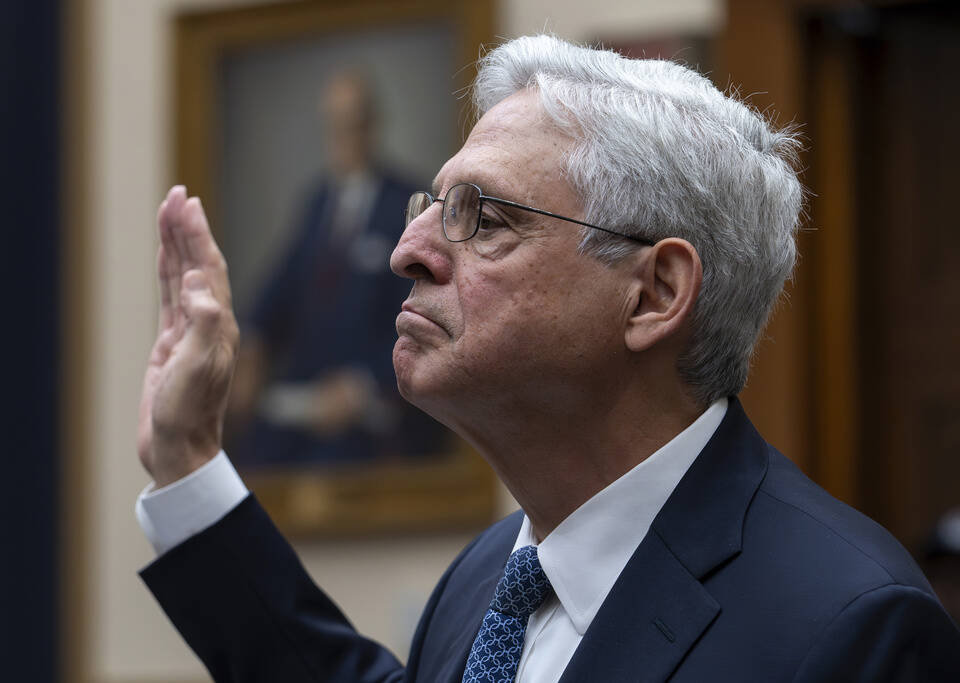Attorney General Merrick Garland testified before the House Judiciary Committee, led by Chairman Jim Jordan (R-OH), today. They’re trying to push him on why he took David Weiss, who is the U.S. Attorney for the District of Delaware, and made him special counsel to go after Hunter Biden two minutes ago. Weiss has been investigating Hunter for years now and could have brought charges many times. He let them slide and let the statute of limitations expire on the most egregious counts, like the tax charges that would have brought up the connection to the Burisma (the Ukrainian energy company Hunter was on the board of).
He’s been really running to protect Hunter Biden. If you look at the way he’s conducted that investigation and if you look at the IRS whistleblowers’ testimony, it’s very clear David Weiss is on Hunter’s team. Then he tried to sneak through this settlement agreement that would have given Hunter immunity for everything – Burisma, foreign agent, all this stuff – with just a slap on the wrist for the remaining lame tax charges and the gun charges.
Special Attorney Status
So all along, people have been wanting to know how is it that this whole thing got allowed? Why didn’t Weiss seem empowered to bring charges like the IRS whistleblowers claim he admitted he wasn’t. They’ve alleged that when they asked where the most serious tax charges were, he told them he couldn’t bring them because they were in California and Washington, DC, and was not granted authority to bring charges in those jurisdictions.
Well, former U.S. attorney Andy McCarthy at National Review has been doing yeoman’s work on this, and he’s pointed out that this happens all the time. A U.S. attorney in one district may be investigating a case in which the target of the investigation turns out to have committed a bunch of crimes in another district where that U.S. attorney has no jurisdiction.
In such cases, that U.S. attorney would normally go to the U.S. attorney for the area in question and ask them to partner on the case. Sometimes that U.S. attorney will say, ‘Sure, let’s do it,’ and sometimes they will say, ‘No, not interested. It can be your thing.’ When the latter happens, the original U.S. attorney can go to the U.S. attorney general – who is the boss of them all – and ask for what is essentially a permission slip to bring the case.
Such a request is almost always granted, and that person then gains what is known as ‘special attorney status.’ This is not to be confused with a special counsel, who does not work with the attorney general in any capacity. As soon as you’re a special counsel, you’re independent and you don’t deal with the AG.
Naming a Special Counsel
Throughout this investigation into Hunter, people have been saying there should be a special counsel, somebody with independence who is outside the government and not currently answering to Attorney General Garland as a U.S. attorney. But Garland didn’t do it.
Now that the sh-t has hit the fan, people are zeroing in on what Garland has said and what Weiss has said via letters and testimony. The line they’ve come up with is that Weiss never asked for special counsel authority, but he always could have. Weiss claimed in writing earlier this summer that he was assured by the Justice Department that if he needed special attorney status (i.e. the temporary permission slip to go into somebody’s jurisdiction without being special counsel), it would be granted if necessary.
The big question to today is what the hell happened after that assurance was given to David Weiss? We know from the IRS whistleblowers and reporting from The New York Times that Weiss was denied by the U.S. attorneys in California and Washington, DC, when he inquired about bringing charges. At that point, a willing prosecutor should have gone to Garland and asked for more authority.
It’s a fraught situation because Weiss is basically saying, ‘Can you give me a special permission slip to go prosecute the president’s son when you, as the attorney general, are working for the president?’ But in any event, Weiss should have done that. And he seems to be claiming he did something like that because he went to Garland and said he was told he gets a special attorney status if necessary. But what happened next? Did Weiss then bring a case? Oh wait, he didn’t. He let the statute of limitations expire in California. He let it expire in DC. He appears to have done nothing.
‘If Necessary’
So, what did ‘if necessary’ mean? What Garland is saying today is, ‘I didn’t interfere.’ ‘I was so hands off.’ ‘I treated it like plutonium.’ ‘I didn’t come anywhere near it.’ Well, then what did ‘if necessary’ mean? What did David Weiss have to prove to get to ‘it’s necessary, go ahead and bring the case’? Is it on Garland who wouldn’t say, ‘Yes, we’re at the necessary point,’ or is it on David Weiss who got the ‘it’s necessary, we’ll give it to you’ and then just put his hands over his ears, closed his eyes, and decided to sit there until the statute of limitations expired.
Either way, my main takeaway from listening to Garland wiggle and worm on the Hill today is he’s a snake and a liar and is doing everything in his power to obfuscate real answers on how this all went down and why the most serious charges against the president’s son are no longer possible because the statute of limitations has run.
You can check out Megyn’s full analysis by tuning in to episode 631 on YouTube, Apple Podcasts, or wherever you like to listen. And don’t forget that you can catch The Megyn Kelly Show live on SiriusXM’s Triumph (channel 111) weekdays from 12pm to 2pm ET.


